| Srl | Item |
| 1 |
ID:
079898
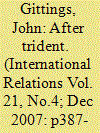

|
|
|
|
|
| Publication |
2007.
|
| Summary/Abstract |
The British government decision on `Trident renewal' forms part of a much wider rebuff to the non-proliferation and peace agenda. The Nuclear Non-Proliferation Treaty risks being discredited at its next review in 2010; new nuclear powers are setting the pace for others; another `war' is being threatened which will last `for generations'. There has been no post-Cold War peace dividend, and the chance to make up for lost time has been missed. War, not peace, is once again seen as the universal default mode.
It is now clear that traditional arguments in favour of peace and nuclear disarmament are never going to succeed. The view that one `cannot predict the unpredictable', used to justify the Trident decision, will always result in decisions being reached on a worst-case scenario. New arguments need to be developed with a broader appeal based not only on strategic calculation but on a compelling alternative world view.
Looking both forward and back into history we have to rediscover peace, not war, as humanity's central concern. Just as the test of the good ruler in ancient China was to maintain peace within the four corners of the kingdom, so today modern states have a shared obligation to exercise good governance across the globe. The effort to reshape our common goals will require a sustained exercise in the re-education of elites, and the mobilisation of multitudes
|
|
|
|
|
|
|
|
|
|
|
|
|
|
|
|
| 2 |
ID:
131634
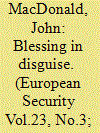

|
|
|
|
|
| Publication |
2014.
|
| Summary/Abstract |
This article examines the implications of Scottish independence for the UK's nuclear posture. It is argued here that a vote for independence will critically undermine this posture. Since the UK nuclear force operates entirely out of Scotland, and since the Scottish government continues to assert its intention to see nuclear weapons removed from an independent Scotland, it is overwhelmingly likely that a 'Yes' vote will prompt a demand for the drawdown of the UK nuclear force in Scotland. If it wished to maintain its nuclear capability, the UK government would then have to make alternative basing arrangements. It is argued here that a host of legal, financial and political difficulties may preclude any such relocation and that Downing Street may ultimately be left with little option but to surrender the UK's nuclear capability. This article concludes that far from weakening the UK, a surrendering of its nuclear posture would result in a stronger and more functional UK military footprint and would bolster the UK's standing in the international arena.
|
|
|
|
|
|
|
|
|
|
|
|
|
|
|
|
| 3 |
ID:
158677
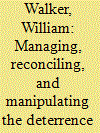

|
|
|
|
|
| Summary/Abstract |
Norm contestation and the search for legitimate and acceptable compromise have been persistent features of the nuclear non-proliferation regime. They have also marked the domestic politics of nuclear weapons, especially within democracies. How do those internal and external contestations and searches for compromise interact? Attention will focus on the United Kingdom that stands out for the openness of domestic debate on nuclear policy, division within political parties, and the role granted to parliament. The United Kingdom has held to an idea of order and responsible stewardship entailing the managed coexistence of nuclear deterrence, arms control, and non-proliferation. Active pursuit of multilateral nuclear disarmament to this end has also helped governments to constrain domestic opposition to the nuclear force's (Trident's) renewal and modernization. The United Kingdom's alignment of domestic and international stances on nuclear weapons is today being jeopardized by its internal turmoil and by international discord over nuclear norms and rules.
|
|
|
|
|
|
|
|
|
|
|
|
|
|
|
|
| 4 |
ID:
153900


|
|
|
|
|
| Summary/Abstract |
This article argues that the study of national identity is central to understanding and explaining national and transnational nuclear politics. It argues that the meanings assigned to nuclear weapons are not fixed or self-evident, but are instead changeable and contingent on social and historical context. The article develops this argument by studying how the Scottish National Party has framed UK nuclear weapons in ways very different from those of the major UK political parties. It argues that the SNP has done this by developing and promoting a specific national identity for an independent Scotland in which nuclear weapons have no place. This identity is juxtaposed against that of a “Westminster other” for whom nuclear weapons remain highly valued. The article provides an original constructivist case study of contemporary Scottish-British nuclear politics and the social construction of nuclear identities in the context of the 2014 Scottish-independence referendum and the 2015 general election.
|
|
|
|
|
|
|
|
|
|
|
|
|
|
|
|
| 5 |
ID:
086844
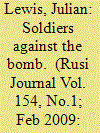

|
|
|
|
|
| Publication |
2009.
|
| Summary/Abstract |
The current economic crisis and two costly wars have put much strain on British defence planners. Government expenditure is being placed under increasing scrutiny. There have been voices claiming that Trident is an unnecessary expense. This article counters this argument and advocates the necessity of maintaining and renewing Britain's nuclear deterrent.
|
|
|
|
|
|
|
|
|
|
|
|
|
|
|
|
| 6 |
ID:
086843
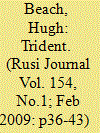

|
|
|
|
|
| Publication |
2009.
|
| Summary/Abstract |
Britain has possessed its own nuclear weapons for just over fifty years and is laying plans to keep them going for the next half-century. Hugh Beach argues that there are better things to spend government money on and the Trident replacement programme should be cancelled.
|
|
|
|
|
|
|
|
|
|
|
|
|
|
|
|